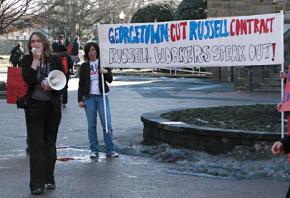No sweats victory over Russell
reports on a breakthrough victory for workers and students organizing for union rights at a Russell Athletic factory in Honduras.
ANTI-SWEATSHOP activists scored a major victory at Russell Athletic on November 14 when the company was forced to reinstate 1,200 workers fired from its Honduras plant. The workers were dismissed early this year, shortly after their factory was unionized.
The campaign to get workers their jobs back was spearheaded by the 12-year-old organization United Students Against Sweatshops (USAS), which lead a 10-month campaign to pressure Russell Athletic, as well as its parent company Fruit of the Loom, owned by billionaire investor Warren Buffet.
The company agreed not only to reinstate the fired workers and reopen the factory in Honduras, but to recognize the union of Jerzees de Honduras workers, SITRAJERZEESH, and to refrain from any future attempts to block unionization at all Russell and Fruit of the Loom factories in Honduras.
In the past, Russell was known as a viciously anti-union company. Management fired 145 workers in 2007 for supporting a union, and union activists have received death threats for attempts to organize at their factories. "For us, it was very important to receive the support of the universities," Moises Alvarado, president of the union at the factory, told the New York Times. "We are impressed by the social conscience of the students in the U.S."

Activists employed a wide range of tactics to put pressure on universities, which resulted in 96 schools canceling contracts with Russell that allow the company to put university logos on their products.
At Cornell University, for instance, activists flew Honduran workers to campus to talk about their struggle, and organized demonstrations at the university bookstore and Dick's sporting goods store in Ithaca, which sells Russell apparel. In Omaha, students knocked on Warren Buffet's door to deliver a message about working conditions at his factories. Organizers drew into the campaign students from more than 100 universities that didn't have USAS chapters.
The response from universities was also a belated result of a wave of activism starting in the late 1990s, when USAS was born as one part of a rising global justice movement. The late '90s saw a wave of sit-ins, sometimes involving hundreds of students and lasting several days, which forced schools to adopt "codes of conduct" relating to the rights of workers who manufacture clothing that carry university logos.
After a number of victories were scored around this demand, activists attempted to make them more than symbolic by forming the Worker Rights Consortium (WRC), an agency created to monitor the factories involved, and then organizing another wave of sit-ins and demonstrations to force university administrations to join it.
Although the initial momentum of the anti-sweatshop movement eventually died down, activists in USAS have continued to work over the last decade to expand the WRC to more schools. As a result, when the WRC sounded the alarm over Russell's union-busting move, students across the country used these past victories to pressure university administrations to cut off their contracts with Russell.
"This is the first time we know of where a factory that was shut down to eliminate a union was later reopened after a worker-activist campaign," said USAS International Campaign Coordinator Rod Palmquist. "This is also the first company-wide neutrality agreement in the history of the Central America apparel export industry--and it has been entered into by the largest private employer in Honduras, the largest exporter of T-shirts to the U.S. market in the world. "This is a breakthrough of enormous significance for the right to organize--and worker rights in general--in one of the harshest labor rights environments in the world."
Hopefully, students can use this example to further other struggles in solidarity with workers in the U.S. and abroad.


